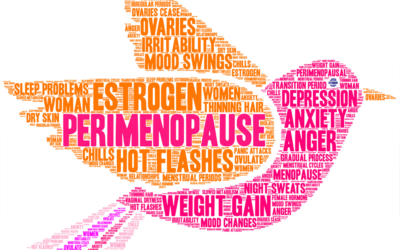

Are You Navigating the Symptoms of Perimenopause?

When I was in my mid-forties I started experiencing a number of seemingly unrelated symptoms – weight gain, brain fog, sore joints, and fatigue. I tried all sorts of one-off fixes – diets, exercise programs, and magic pills – without success. It wasn’t until my period started changing and I experienced hot flashes that the penny dropped and I connected everything to perimenopause. Did it happen like that for you too?
I wonder why there isn’t more talk about perimenopause? After all, it happens to all ladies, although it’s true that some have more challenges with it than others.
Perimenopause (and menopause) is the bookend to puberty, the reproductive part of our lives. So it includes a lot of hormone changes as the reproductive hormones – primarily estrogen and progesterone – naturally decline.
But the real challenge comes with how those changes impact our wellbeing. Like mood swings, inability to sleep, extreme fatigue, joint pain, digestive issues, hot flashes, night sweats, low sex drive and weight gain. What’s up with all that? Why can’t we just wind up our periods and call it a day?
There are two paths for getting help with perimenopause. The medical path and the lifestyle path. Unfortunately, many doctors are not well equipped to help. The American Association of Retired Persons reports most medical schools and residency programs don’t teach physicians in training about menopause. To make matters worse, a recent survey found that just 20% of ob-gyn residency programs provide any kind of menopause training.
When asked, 3 out of 4 ladies reported they did not get adequate treatment when they brought perimenopausal and menopausal concerns to their doctors. And 84% of women say their symptoms interfere with their lives and some are even debilitating.
One of the main areas where doctors should be able to help is in prescribing Hormone Replacement Therapy (HRT). Even though treatment has changed dramatically over the past decade, many doctors are unaware. The new body identical treatment is administered in patches or gel and poses none of the earlier health concerns for breast cancer and heart disease. The topical delivery method means that the liver is completely bypassed, and that absorption through the skin dramatically changes the health risks. Dr. Louise Newson, The Menopause Doctor, goes so far as to encourage women to consider taking body identical HRT for the protections it provides against heart disease, osteoporosis, diabetes and Alzheimer’s.
The other path to get help with the symptoms of perimenopause is through lifestyle. There is a lot that lifestyle habits and behaviors can do to demystify the changes. It turns out the healthy practices of diet and exercise that ladies maintained before perimenopause are unlikely to suit them very well once they enter perimenopause. As our nutrition needs change, so does our digestion. We no longer need all the protein we used to eat, and our sensitivity to sugar and processed foods heightens. Bloating, brain fog, joint pain and weight gain result.
And with hormonal changes to our muscles and joints, the type of exercise and movement that is beneficial also changes. Even if you have always been athletically active, the fatigue and joint pain can make ambitious workouts very difficult. In fact, high impact and anaerobic exercise can cause stress to the system and result in the production of cortisol, the stress hormone. The timing and type of movement you choose take on new importance.
Hormonal changes impact sleep, especially when combined with food choices and stress. So figuring out new sleep hygiene habits are vital to being able to restore the body each night with quality sleep. As we sleep, the body is busy removing dead cells burning fat and rebuilding tissue. The brain catalogues the day’s experiences and builds up memories. Without adequate sleep, the body is stressed when it cannot carry out these maintenance functions and produces cortisol in response. That in turn stimulates appetite, which produces more insulin leading to fat production (and stubbornly stored around the middle). So getting enough good sleep is vital to being able to adapt through the changes of perimenopause.
And finally, mindfulness – getting your head in the game is so important. As it happens, the mind can only focus on one thing at a time. So if you control some of the things you tell yourself and make them positive things, you will benefit from that. Rather than tell yourself that you’re a lazy slob or beat yourself up because you don’t have enough willpower, you tell yourself that you’re an intelligent woman and the goal is achievable. Meditation is a great way to calm the mind, focus on positive things and create endorphins. This can really help to create positivity, reduce cortisol levels and help with sleep.
Are you satisfied with the support your doctor has been giving you for the symptoms of perimenopause? Some symptoms are best resolved using HRT. But many more can be resolved by taking a lifestyle approach.
The beginning of my perimenopausal journey didn’t go well, and I’m determined to help ladies navigate this chapter of their lives so they can take control of the next decades and live their best lives.
To find out how you can navigate the symptoms of perimenopause, click the button to book your free call with Dyna Vink, Health and Nutritional Coach.
Do You Get Cravings?

It’s pretty normal to have food cravings when you make changes to your food choices. Especially if those changes include eliminating sugar. Sugar is found in almost all processed foods these days, and our bodies have been processing way more sugar in the past decade than in previous times.
We know that sugar is the primary culprit connected with many undesirable conditions – insulin resistance, unstable blood sugar, pre-diabetes, inflammation – most of which include weight gain.
What is a craving? Turns out a craving has physiological and psychological sides. The physiological side happens when there is an imbalance of hormones, such as leptin and serotonin. Those appetite stimulating/depressing hormones make your body crave satiation. These taps on the appetite centers of the brain are usually separate from actual hunger.
The psychological side starts in the area of the brain responsible for memory, pleasure, and reward. You see something or think of something pleasurable and that generates a desire to recreate the pleasure – which results in a craving. It may also be stimulated by an emotional need – to feel comforted for example – so your brain recalls a situation where you felt loved and cherished. Often these scenarios involve foods, so your mind tries to get you to recreate the stage where you felt good, and that often incudes a specific food.
Cravings usually don’t last very long, about 3 minutes. And they typically subside after a week or two into a new set of food choices.
So what can we do to stop them (or run down the clock)?
Distract yourself with a task and tell yourself that you’ll address the issue later (hopefully moot after the craving passes)
Use the essential oil ClarySage in a diffuser or mixed with a transport oil on your body in key spots (wrists, behind knees, behind ears)
Go for a walk
Prepare a cup of tea or coffee (decaf)
Brush your teeth
Ask yourself what kind of hunger this is. If it’s time for a meal, eat. If you’re thirsty, drink. If you’re bored, find your ToDo list and check something off. If it’s an emotional response, sink into that need and satisfy it another way. For example, feeling lonely and disconnected? Reach out to a friend and chat.
If all else fails, try eating a teaspoon of nut butter, a stalk of celery or a small square of dark (80%) chocolate.
Learning to decipher the messages your body is sending is so valuable. Have you tamed your cravings?
#holistichealth #nutrition #foodchoices #cravings #perimenopause

Holistic Nutrition Lifestyle | Copyright © 2025 | All Rights Reserved
“This site is not a part of the Facebook website or Facebook Inc. Additionally, this site is NOT
endorsed by Facebook in any way.
FACEBOOK is a trademark of FACEBOOK, Inc.”